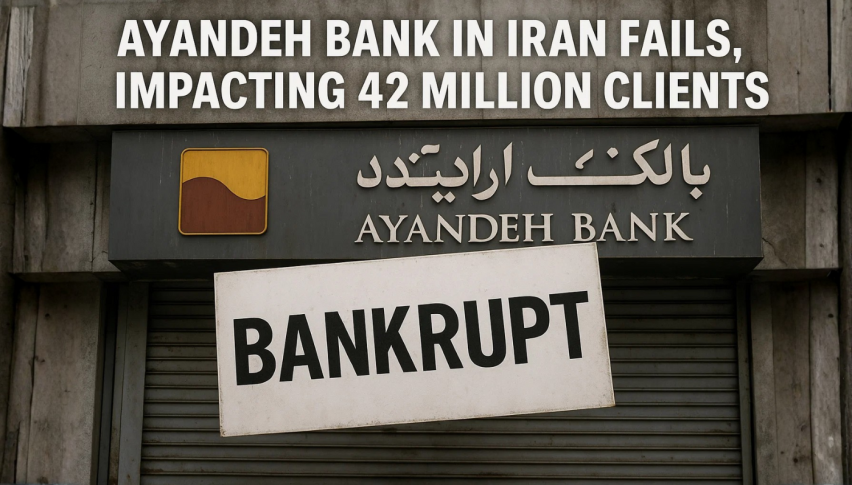Ayandeh Bank in Iran Fails, Impacting 42 Million Clients
Ayandeh Bank one of Iran's biggest private banks officially announced bankruptcy damaging the nation's already precarious financial sector.

Quick overview
- Ayandeh Bank, one of Iran's largest private banks, has officially declared bankruptcy, impacting over 42 million subscribers.
- The Central Bank of Iran will transfer Ayandeh's assets to Bank Melli Iran following the bank's accumulation of around $8 billion in debt.
- Experts attribute Ayandeh's downfall to poor management, bad loans, and a lack of oversight, with the bank disbursing loans far exceeding legal limits.
- The bankruptcy highlights ongoing issues of corruption in Iran's financial sector, raising concerns about the potential for increased inflation and further bank failures.
Ayandeh Bank one of Iran’s biggest private banks officially announced bankruptcy damaging the nation’s already precarious financial sector. Bank Melli Iran’s largest state-owned bank will now take over Ayandeh’s assets and branches, according to a statement released by the Central Bank of Iran (CBI). Nationwide this action impacts over 42 million subscribers.
Ayandeh Bank’s fall followed the accumulation of around $8 billion in debt and losses. The bank was forced to be dissolved after the CBI’s unsuccessful attempt to save it failed. The 270-branch bank was badly hurt by bad loans, subpar management, and corruption.
Reports claim that Ayandeh’s troubles started years ago when it made large loans without conducting the necessary due diligence, many of which went to insiders and connected companies. There were large financial gaps as a result of these loans’ infrequent repayment. According to information released by the central bank Ayandeh disbursed over ten times as many loans as permitted by law.
🇮🇷 NEW: Iran's Ayandeh Bank goes bankrupt after accumulating $8B in losses and debt, impacting 42M customers now absorbed by state-owned Bank Melli.
Is this type of collapse exactly what Bitcoin was designed to solve? pic.twitter.com/EvY31ckxMd
— Cointelegraph (@Cointelegraph) October 27, 2025
The fall of Ayandeh has turned into a significant Iranian controversy. One of the wealthiest businessmen in Iran, Ali Ansari founded the bank through a 2013 merger and made investments in upscale ventures including Iran Mall, the biggest shopping center in the world. Experts however claim that this development was financed via hazardous loans and little oversight.
The CBI said that Ayandeh was in charge of more than 40% of all bank overdrafts in Iran and that its capital adequacy ratio was -600% which was much less than the 8% minimum required by international standards. This demonstrates how seriously the bank’s finances had gotten out of out of control.
The public has been told by authorities that bank Melli will provide access to customer deposits, which are secure. Experts caution that Iran’s already high rate of inflation would probably get worse as a result of the bailout. In order to pay for much of the expense of saving Ayandeh, additional money will be printed, which would lower the purchasing power of average Iranians.
The CBI also warned that if they don’t reform eight more Iranian banks could be shut down. Currency depreciation, limited access to international financial markets, and international sanctions have all put significant strain on the nation’s banking system.
Bank Melli Iran's mismanagement, especially evident in the Bank Ayandeh scandal, symbolizes a clear display of incompetence and systemic corruption that has resulted in the collapse of the national currency's value. Under the management of Farzin at the Central Bank of Iran,… pic.twitter.com/ggPIzbGuc0
— Iran Observatory (@IRObservatory) October 26, 2025
Ayandeh’s bankruptcy serves as a reminder of the persistent corruption and poor management that afflict Iran’s economy. The issue is sometimes compared to the early 2010s, when the collapse of unregulated financial institutions resulted in significant losses for the public.
Although the judiciary has committed to conduct an investigation no charges or arrests have been filed as of yet. While some Iranian officials welcomed the bank’s closure as a move in the right direction, others contend that the true cost will be borne by regular residents in the form of higher costs and diminished savings.
Ayandeh Bank’s fall is a disheartening reminder of the risks of inadequate supervision and political meddling in the banking industry. It will be extremely difficult to rebuild public confidence in Iran’s banking institutions as the country’s economy battles with sanctions and inflation.
- Check out our free forex signals
- Follow the top economic events on FX Leaders economic calendar
- Trade better, discover more Forex Trading Strategies
- Open a FREE Trading Account